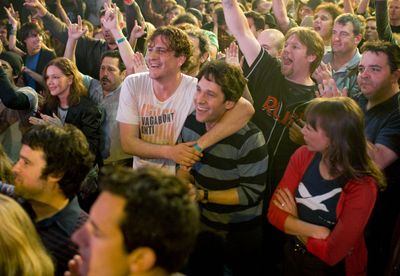‘Love You, Man’ fails to develop premise

In the amiable new comedy “I Love You, Man,” Paul Rudd plays Peter Klaven, a straight real estate agent who, upon realizing that he’s never been very good at platonic male friendships, pursues a “bromance” with a slacker investment expert named Sydney Fife (Jason Segel).
The sexual anxiety of 21st century heterosexual men struggling to be more “sensitive” is a terrific subject; and “I Love You, Man” slyly toys with the arc of a traditional romantic comedy. In this movie, boy meets boy, boy loses boy, and boy and boy eventually reunite – and the only physical intimacy on display is a stiff-shouldered hug.
If the picture never quite achieves a groundswell, and if Rudd and Segel are left stranded by the underpowered screenplay, that’s probably to be expected. Like many recent American comedies, “I Love You, Man” ultimately feels like a clever concept in search of a completely developed movie.
Directed by John Hamburg (“Along Came Polly”), who co-wrote the screenplay with Larry Levin (“Doctor Dolittle”), “I Love You, Man” begins with Peter proposing to his girlfriend Zooey (Rashida Jones). Plans for the wedding are just under way when the couple encounters an unexpected problem: Peter has no close male friends who might serve as his best man.
Enter his parents (J.K. Simmons and Jane Curtin) and gay personal trainer brother (Andy Samberg), who try to help him arrange a few “man dates,” all of which go disastrously.
The early courtship sequences between Peter and Sydney, too, promise something greater than the movie ultimately delivers. The two men meet at one of Peter’s open houses (Sydney attends them for the free food and the people-watching). The next week, Peter gingerly reaches out to him and sees if he wants to meet for drinks – at which point, the movie reveals a surprisingly emotional undercurrent.
Meeting a new friend and confidante, “I Love You, Man” gently argues, can be just as intoxicating as meeting a potential lover – especially for straight men who have never before had such relationships in their lives.
The problem is that, once the friendship between Peter and Sydney has started to flower, “I Love You, Man” has nowhere to go – or at least nowhere that isn’t grindingly predictable and familiar.
That “I Love You, Man” hangs together is a considerable testament to the lead actors: Segel settles comfortably into the role of the ne’er-do-well second banana. He struts through the movie with an easy-does-it charm, revealing earnestness and even depth.
As for Rudd, in just a few years time, in movies like “The 40 Year-Old Virgin” and the vastly underrated “Role Models,” he has carved out a curious niche that feels completely suited to these unsettled times: He makes unthreatening sweetness seem very sexy.
In “I Love You, Man,” Rudd plays the straight man in every sense of that term.
For times and locations, see page 6.